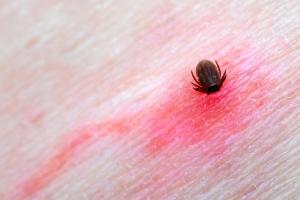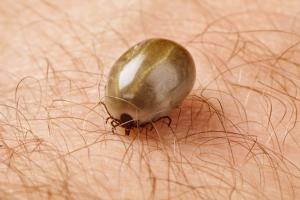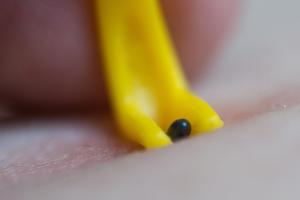Tick-borne encephalitis (TBE)
Tick-borne encephalitis (TBE) is a viral infectious disease affecting the central nervous system. The virus is transmitted by the bite of infected ticks, found in woodland habitats. It's not found in Northern Ireland, but there's a low risk of getting it in parts of Europe and Asia.
Symptoms of TBE
About two-thirds of people infected with the virus don’t get symptoms.
If symptoms do develop, they usually start seven days after being bitten, but can occur up to 28 days later.
TBE starts with symptoms including:
- fever
- fatigue or tiredness
- headache
- muscle aches
- nausea/feeling sick

These symptoms usually last about five days. Then there will be a period of about seven days (but can be for up to a month), where there are no symptoms.
The illness that follows is a serious one that can be fatal, with the infection affecting the brain and spinal cord, with symptoms of meningitis (inflammation of the membrane that surrounds the brain and spinal cord) and/ or encephalitis (inflammation of the brain).
Symptoms can include:
- being sick
- a headache
- a stiff neck
- a dislike of bright lights
- changes in mental state, such as confusion or disorientation, changes in personality and behaviour, and drowsiness or unresponsiveness
- seizures (fits)
- difficulty speaking
The European virus is associated with milder illness, with one-third developing the more serious infection of the brain and spinal cord.
For every 100 people developing it, one or two will die with it.
Of those who survive, a significant number will have ongoing serious problems.
The Asian virus is associated with more severe disease, often with no symptom-free interval.
Up to one-third of those developing infection in the brain/ spinal cord will die.
In those who survive there are higher rates of ongoing serious problems.
Check if you could be at risk of TBE
The risk of getting TBE while travelling is very low.
Ticks that spread it are found in:
- most of Europe (not the UK)
- Russia
- parts of China and Japan
Ticks live in forests and grassy areas. You're more at risk of being bitten if you do activities like hiking and camping.
Not all ticks spread TBE. Even if you're bitten, the risk of getting seriously ill is low.
You can check the risks of the country you're travelling to on the Travel Health Pro website.
TBE vaccine
Consider having the TBE vaccine if you're visiting a country where the infection is found and you're planning to do outdoor activities when you get there.
Two injections of the vaccine can protect you for about a year.
A third injection can protect you for about three years.
You need to have the first injection at least one month before travelling.
The TBE vaccine isn't available on the health service. Search online for a travel clinic that offers it.
How to avoid tick bites
Try to avoid being bitten by ticks in places where TBE is found, even if you've been vaccinated.
To reduce the risk of being bitten:
- cover your skin while walking outdoors and tuck your trousers into your socks
- use insect repellent on your clothes and skin – products containing DEET are best
- stick to paths whenever possible
- wear light-coloured clothing, so ticks are easier to spot and brush off
How to spot and remove ticks
Tick bites aren't always painful. You may not notice a tick unless you see it on your skin. Always check your skin and hair after being outdoors.

Ticks can sometimes be very small and hard to spot. They get bigger if they bite you and feed on your blood.
Remove them by grasping them close to the skin with fine-tipped tweezers or a tick removal tool

To remove a tick safely:
- use fine-tipped tweezers or a tick removal tool - you can buy these from some pharmacies, vets and pet shops
- grasp the tick as close to your skin as possible
- slowly pull upwards, taking care not to squeeze or crush the tick - dispose of it when you've removed it
- clean the bite with antiseptic or soap and water
The risk of getting ill is low. You don't need to do anything else unless you become unwell.
When to see your GP
If you've been bitten by a tick or visited an area in the past month where infected ticks are found you should see your GP if you have:
- flu-like symptoms – such as feeling hot and shivery, headaches, aching muscles or feeling sick
- a circular red rash
Tell them if you've been in forests or grassy areas.
When to get immediate medical help
Go to hospital if you or someone else:
- gets a stiff neck and a severe headache
- gets pain when looking at bright lights
- has a seizure (fit)
- has a change in behaviour – such as sudden confusion
- develops weakness or loss of movement in part of the body
More useful links
The information on this page has been adapted from original content from the NHS website.
For further information see terms and conditions.